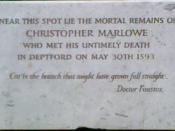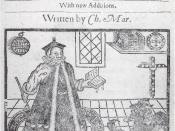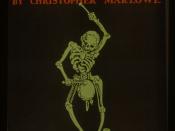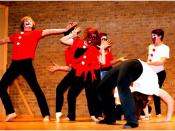Hyperbole, the cornerstone to any good tale, can go a long way in the hands of a competent author. Christopher Marlowe'sThe Tragical History of Doctor Faustus proves this rule. Marlowe's use of hyperbole, exageration, directly effects the tone, characterization, and thematic impact of the play. By bending this seemingly simple literary device to his will, Marlowe creates a world that seems larger than life.
While hyperbole generally lends itself to more humorous works, in The Tragical History of Doctor Faustus it creates a tone of grand adventure and incredible deeds. "His waxen wings did mount above his reach, And, melting, heavens conspired his overthrow," (Marlowe 251). By comparing Faustus to Icarus, Marlowe places his lead character on a pedastal along with many famous characters. The extensive exageration makes every action seem to be the most important, which helps the play along with its "epic" quality. Instead of describing things the way they are, Marlowe uses extravagent exagerations to inflate the importance of a scene or character.
When every action, character, and description in a work is larger than life, the tone of the story follows suit.
Hyperbole has a profound effect on the perception of the characters found in The Tragical History of Doctor Faustus. Mephistopheles is, of course, a devil of extraordinary power, being able to grant any wish imaginable. But without Marlowe's lofted poetry, he would be nothing more than an angry djinni. Robin, a rather minor character, has very little to do with the plot of the story and can easily be overlooked. Although this is true, he becomes a source of hilarious comic relief through a large helping of exageration. Robins speach itself is an exagerated dilect used by the lower classes and the fact that his mind is almost always on the subject of sex gives people something to laugh at. Robin becomes the epitome of the base, lower classes. Even Doctor Faustus benefits from the overabundant use of exageration. Marlowe's use of hyperbole transforms Faustus from a would be, second-rate magician, into a heroic, but tragic, figure. Faustus is filled with ideals on how he will use his power over the spirits to better the world, these ideals are so vaulted that when Faustus forgets them it a crushing blow to how we see him as a character. Exageration makes these characters the memorable figures they are today and without Marlowe's liberal use of hyperbole they would be easily forgotten.
The Tragical History of Doctor Faustus houses a few important themes; the divided nature of man, power as a corrupting influence, and sin, damnation, and redemption. Sin, damnation, and redemption are central to the plays plot and are always hanging just over-head. Sin is the act of disobeying God's will, which Doctor Faustus does on numerous occasions. But Faustus does not just commit a run-of-the-mill sin, he commits the ultimate sin by not only disobeying God, but renouncing his obediance altogether and swearing allegiance to Lucifer. Thus Faustus' soul is damned, but there is always the hope of redemption, which Faustus constantly rejects until his last moments. The saying "power corrupts" is a leading factor in The Tragical History of Doctor Faustus. Faustus begins the play with extraordinary ideas on how he will use his magic to better the world, moving rivers, ending wars, and feeding the hungry. The extremes of his ideals makes it harder to watch as the god-like power Faustus obtains corrupts him, causing him to care more about his own pleasure than his plans for bettering the world. All men are divided by their conciences, the choice between good and evil. Of course, Marlowe is not happy with just an internal monologue, so Faustus' conscience is personified as a pair of angels, one good and one evil. This exagerated showing of good and evil within Faustus helps us understand just how heavily this decision is weighing on Faustus and how hard the choice is. These themes are of a rather ordinary sort, but combined with Marlowe's style of writing, they become something more. They become deep and thought proviking questions that will last through the ages.
Christopher Marlowe's life was filled with extremes and his writing followed suit. Through an extensive use and understanding of hyperbole, Marlowe creates a world where anything is possible, characters who are willing and able to do these things, and themes that gives these actions meaning. Without this over-blown style, The Tragical History of Doctor Faustus would be nothing more than a nice story about the fall of a nice man. But in the hands of Christopher Marlowe the story takes on a life of its own, taking its readers on a thought provoking ride trough a living world filled with memorable characters.
Works CitedEnglish Renaissance Drama a Norton anthology. New York: W.W. Norton, 2002.






Average
This essay could use some filling out, it's a good starting point. This paper can be submitted.
0 out of 0 people found this comment useful.